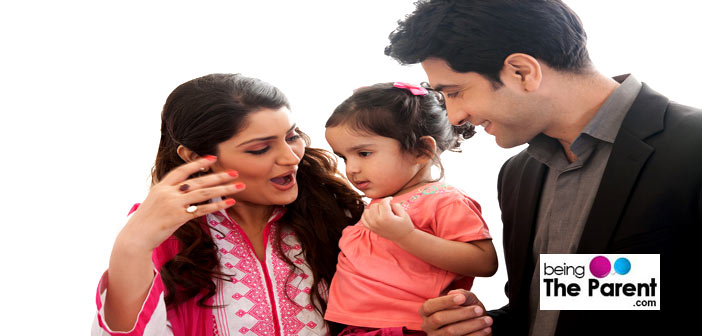With 22 official languages and 780 spoken languages, India could very well be the country with maximum bilingual families! Even if you are not married to someone who speaks a different language, you might still have your mother tongue along with Hindi and English spoken in your household.

There is one group of bilingual advocates who say that a child should be exposed to as many languages as possible from as early as possible as it would help him grasp and learn all of them. They advocate that learning more languages early on can foster creativity and builds cognitive skills. There is another set of bilingual naysayers who say that multiple languages can cause speech delays and confusion in children. Strangely, both arguments seem valid! So let us explore them in more detail.
Who Are Bilingual Families?
When someone can understand and express, two different languages, he is known to be a bilingual. Similarly, if two people belonging to two different regions get married, they become a bilingual family. In this case, either both the partners can speak and understand both the languages, or each can know only his or her own native language. In India, English and Hindi are generally the two languages most largely understood and spoken by and large, however, there are many other languages that people speak at homes and amongst their native. Their children are exposed to two different sets of languages, apart from the prevailing language spoken in their state/culture/country.
Being plurilingual means having these skills in more than two languages.
Advantages Of Being A Bilingual Child
- More skills:Research has shown that kids who can speak more than one language have:
- Better creativity
- Stronger cognitive skills (they might find it easier to pick up a third language later on!)
- Faster at developing problem-solving skills
- More languages: Young minds can learn languages faster. Learning a new language is easier when they are below 10, even easier when they are below 5 and the best when they are below 3 years of age
- More opportunities: There are many benefits of knowing an additional language. As the child grows, being multi-lingual can open up opportunities for him, it can help him communicate better with the elders in the family and it can make travelling more interesting!
Disadvantages Of Being Bilingual A Bilingual Child
- Speech delays: Research shows that kids being raised in a bilingual household start talking a little alter than their peers. However, this delay is temporary. Over time, they will catch up with the peers and will have the added advantage of communicating in two different language
- Mixing languages: Kids from bilingual homes often mix both the languages in same sentence. Adults normally misunderstand this and assume that the kids cannot tell the difference between two languages. This is not true. They are mixing mainly to make up for the limited vocabulary. If they want to say something, but doesn’t know how to do so in the language they are speaking, they just borrow the same word from the other language. This again is temporary. They will stop doing this once their vocabulary improves
- Confusion: An argument similar to the last point, some people say that 2 different languages can cause confusion in the child who will not be able to differentiate between them. While this might be true when there are more than 2 languages the child is listening too (not uncommon for couples who live out of their home state and have local nannies), it is mostly a misconception for bilingual households. Research shows that kids as young as 6 months can differentiate between 2 languages
From these points above, it is clear that in the long run, it is more beneficial for your child if he is exposed to multiple languages from a young age. So, the next question is:

5 Tips For Bilingual Child’s Language Development
It can be a bit frustrating when your child misses a speech milestone and everyone tells you it’s because “you introduced 2 languages at a time!” Here are five things you can consciously do to help your kid grasp the language better and faster:
- Agree on multilingualism: Decide on an approach that is mist suitable for your family. You can go with “one parent, one language”, where, as the name suggests, each parent speaks in a different language or “one for home, one for school”, where you speak only one language at home and let the kid pick up the other in school. The disadvantage of latter method is that most schools use English as the main means of communication and hence the child might not end up learning the local language, if that was your intent. You have to reach an amicable agreement as to which language would be largely spoken, and though this can be difficult, finding an acceptable way that would benefit both the parents and the baby is a must
- Speak, speak and speak: Whether you raise a baby in a single language or in more than one languages, the key is to speak, and talk as much as you can. Expose your child to multiple opportunities during the day to hear, speak and practice both the languages
- Take it easy: Do not make language learning a chore. Do not force them to learn a language. It is a skill like any other. They will pick it up when they are exposed to it enough. Babies acquire languages, they cannot be forced to learn! The best you can do is to help the learning process along
- Get interactive: Engage them with other media – books, CDs, songs – and not restrict them to just colloquial language. The more the varied approaches the better the results!
- Never mix languages: Do not mix languages when you speak to them. Ensure that all the words and phrases you use belong to the same language to avoid confusion. You might find your child mixing the languages as well, so correct him politely telling him to use the right word from the language
And a friendly advice to all parents. Be cognizant to the fact that your child might end up picking both languages with same efficiency, or might become stronger in one (dominant language) than the other. This is okay and should not be made an issue. Do not take it on your ego and want your mother tongue to be his dominant language. Expose your child to everything and let him chose what comes naturally to him.
Raising a multilingual child is an immensely rewarding experience. Many of the world’s parents are raising their children with more than one language, so go for it! Keep yourself updated with your child’s language milestones, refer to this link to understand more about speech development in general: Speech development of your child
Happy parenting!
